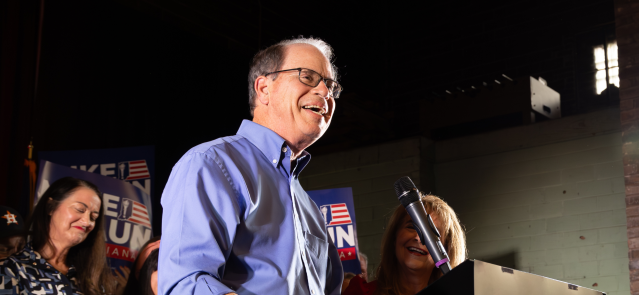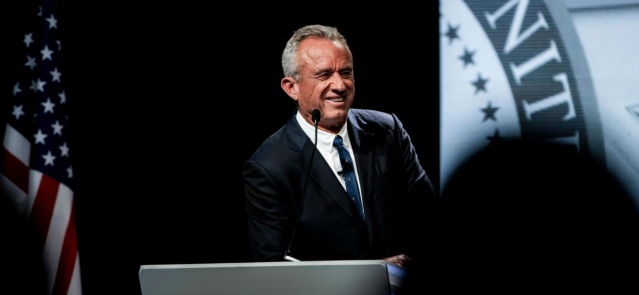Stay ahead of the curve as a political insider with deep policy analysis, daily briefings and policy-shaping tools.
Request a DemoLUCHA Vows to Challenge Unjust Ruling – Hostile Court Is Putting Arizonans at Risk of Persecution & Racial Profiling. Prop 314 (HCR 2060) is Stop and Frisk on Steroids
‘Secure the Border Act’ Withstands Frivolous Constitutional Challenge, Will Appear on November Ballot
Statement from Vice Chairman Thomas Galvin on Attempted Assassination of President Trump
“I am disgusted and appalled by the attempt on President Trump’s life. In the United States, we resolve our differences at the ballot box and move on. We have had too many presidents and candidates struck by assassins or would-be killers. My fervent prayers are for President Trump, his family, and the families of the victims.
I want to assure Maricopa County residents I will do everything I can to keep them safe while they exercise their constitutional right to vote. And I will make sure our law enforcement and public safety officials have all the resources they need. Once again, I pray for President Trump’s full and complete recovery.”Recent Report Ranks Arizona as No. 2 State for Lowest Energy Costs
- Diverse generation sources – Arizona relies on a mix of generation sources, from nuclear, natural gas, hydropower, renewables, and battery storage.
- Self-Sufficiency – Arizona is not dependent on imported power. We tap into the market if needed, but our utilities’ primary focus is providing Integrated Resource Plans to guarantee future readiness. The Commission diligently oversees utility upgrades and construction.
- Proactive maintenance to ensure reliability – The Commission prioritizes daily maintenance and line work leading up to summer to ensure the grid is ready for the extreme heat and high load.
Gallego Demands Accountability for Security Failures that Enabled Trump Assassination Attempt
- Did the Trump campaign request additional protection or resources for this event? If so, were those resources denied, and why?
- Did the Secret Service detail, separate from President Trump’s campaign team, request additional resources?
- Who approved the security plan for this event?
- Was a proper threat assessment of nearby buildings conducted?
- Did attendees of the event raise any alarms? If so, how were any concerns handled before the attempted assassination?
- Were there any failures in protocol that enabled the shooting? If not, how was President Trump, one of only six living current or former Presidents and a current Major Presidential Candidate, almost assassinated, and what needs to change?
- Will the Secret Service reconsider its denial of protection for Presidential Candidate Robert F. Kennedy, Jr.?
Braun holds huge money advantage over McCormick
Republican gubernatorial nominee Mike Braun out-raised Democrat Jennifer McCormick $6.185 million to $781,690, respectively, in the first half of the year. He out-spent her $8.58 million-to-$290,000 during that same time period.
The mid-year quarterly financial reports through June 30 submitted to the Indiana Election Division on Monday also revealed Braun holds $1.68 million cash on hand compared to McCormick’s $700,013.
Braun began the year with a $4.087 million balance. He spent much of that $8.58 million to win the Republican nomination against five GOP primary opponents. McCormick had a $209,252 beginning balance and ran unopposed in the May primary.
Republican lieutenant governor nominee Micah Beckwith reported $81,105 in contributions for the quarter, spent $99,439 and had an ending cash balance of $15,126. He began the year with $33,480. There was no activity from Democratic lieutenant governor nominee Terry Goodin.
Libertarian nominee Donald Rainwater raised $86,734 for the second quarter, spent $22,645 and had an ending balance of $77,210.
McCormick’s financial haul pales in comparison to what Democrat John Gregg raised during his 2012 and 2016 campaigns, the last cycles that Indiana Democrats were competitive in a governor’s race.
In his 2016 rematch with Gov. Mike Pence, and then with Lt. Gov. Eric Holcomb after Pence was nominated for U.S. vice president, Gregg posted $3.025 million for the second quarter and had $5.833 million cash on hand. Pence posted $4.1 million and had $7.4 million cash on hand.
In 2012, Gregg posted $1.7 million in his mid-year report, compared to $3 million for Pence.
In the first two weeks of this month, Braun has out-raised McCormick $533,000-to-$9,000 in large donations posted on the Election Division website.
Brian A. Howey is senior writer and columnist for Howey Politics Indiana/State Affairs. Find Howey on Facebook and X @hwypol.
Correction: This story has been updated to clarify that Mike Braun has raised $6.18M in the first half of the year.
FSSA asks for stay while it appeals Healthy Indiana Plan ruling
The Indiana Family and Social Services Administration on Friday filed a motion to stay while it appeals a ruling that vacated federal approval for the state’s Healthy Indiana Plan 2.0.
In addition, the administration last week sent a letter to the Centers for Medicare and Medicaid Services seeking its support and reissuance of the plan’s approval “in its entirety if a stay is not granted,” the administration said in a Friday news release.
The state’s Healthy Indiana Plan 2.0 provides Medicaid coverage for about 760,000 Hoosiers aged 19 to 64. Offered since 2007, the plan received a 10-year approval from the U.S. Department of Health and Human Services in 2020.
A federal judge in June struck down that approval. Summary judgment was granted to the plaintiffs in the case — three Indiana residents — who claimed the program’s approval violated the Administrative Procedure Act.
The case, first filed in 2019, is now appealed to the U.S. Court of Appeals for the District of Columbia Circuit.
If unsuccessful, the administration fears it might be required to transition some “Plus” plan members to the two-tiered plan’s “Basic” benefit package, which doesn’t include vision, dental and other benefits. They would also be forced to make co-payments, the administration says, instead of monthly POWER Account contributions that resemble premiums.
“The removal of the entire HIP approval also risks the state’s ability to collect the Hospital Assessment Fee, which helps fund coverage for HIP members,” the administration said in the release. “Without this funding, it is unlikely the state can continue to provide coverage at the current enrollment, utilization and reimbursement levels.”
Of the plan’s approximately $5.6 billion annual budget, the Hospital Assessment Fee, a provider-related tax, funds “the vast majority of the 10% state share,” Indiana Medicaid Director Cora Steinmetz wrote in a memorandum filed Friday. She said the fee generates more than $415 million annually to fund the plan.
The administration further contends the federal ruling conflicts with state law, which the administration says would require it to initiate “substantial systems and operational changes that will take 12 months or more.”
On July 1, administration officials halted a planned resumption of charging premiums to those enrolled in the plan, citing uncertainty created by the judge’s ruling. The memorandum says the administration plans to continue the premium pause.
The opening of the Republican National Convention: A crucial moment for citizens nationwide
As the Republican National Convention kicks off in Milwaukee today, the eyes of the nation turn to a pivotal event that could shape the political landscape for years to come. This year’s convention isn’t just a gathering of party faithful; it’s a crucial moment to engage with the democratic process, understand the policies and platforms being proposed and scrutinize the leaders vying for our votes.
The significance of this event — at this time in our nation’s history — cannot be overstated. Milwaukee, a vibrant city with a rich political history, is the perfect backdrop for such a consequential gathering. It is in battleground states like Wisconsin where the future direction of the country often hinges. These are places where every vote counts, and every policy proposal is weighed with keen interest.
State Affairs is on the ground, ensuring that the stories and voices from this convention are heard far and wide. Our dedicated team of reporters is following key candidates and state delegates not only from Wisconsin but also from other critical battleground states like Louisiana and Tennessee. These states are microcosms of the diverse political, social and economic challenges facing the nation. By focusing on these areas, we aim to provide our readers with comprehensive coverage that highlights the stakes involved and the potential impacts on their daily lives.
As a former Washington Bureau Chief for a major, mainstream newspaper, I am no stranger to national political conventions. I know firsthand that the RNC is more than just speeches and pageantry. It is a forum where ideas clash, alliances form, and future state and national leaders emerge. For citizens, it is an opportunity to see beyond the rhetoric and assess the substance of what is being offered.
For state lawmakers, national political conventions serve as a crucial nexus where state and national politics intersect, providing state legislators with the tools, connections and knowledge they need to effectively represent their constituents and navigate the complexities of governance.
The agendas and priorities set at the RNC often trickle down and influence state-level legislation. And the priorities and direction that the national party will take, can — and often does — affect local legislative agendas.
In these uncertain times, the role of the press is more vital than ever. At State Affairs, we are committed to delivering in-depth, unbiased reporting that empowers our readers with the information they need to make informed decisions. As the convention unfolds, we will continue to bring you stories from the front lines that are important to you on the local level, providing context and clarity on the issues that matter most.
Follow along this week: WisPolitics Convention Corridor; WisPolitics on X; Kate Morton on X; Jeremy Alford on X; State Affairs Tennessee on X
Kennedy, Stein presidential campaigns file for Indiana ballot
The campaigns of independent Robert F. Kennedy Jr. and Green Party candidate Jill Stein submitted petition signatures Monday to appear on Indiana’s presidential ballot this fall.
County election officials last week certified enough petition signatures from Kennedy’s campaign to meet the state’s requirement of nearly 37,000, according to unofficial tallies submitted to the state Election Division.
The Stein campaign was several thousand short at the time but submitted a filing by Monday’s noon deadline with the Election Division.
The Election Division said staffers were working Monday afternoon to total the number of certified signatures from registered voters submitted by the Kennedy and Stein campaigns to confirm they met the ballot requirement.
Neither the Kennedy nor the Stein campaigns immediately responded Monday to messages from State Affairs seeking comment on their filings and number of signatures they submitted.
Kennedy, Stein ballot quests
Kennedy and Stein are seeking to join presumptive Democratic and Republican candidates Joe Biden and Donald Trump, respectively, and Libertarian Chase Oliver on the Indiana presidential ballot.
The Kennedy campaign said in a news release last week it had submitted more than 105,000 signatures to county election offices for certification by the July 1 deadline.
“While canvassing for signatures, 99% of the people I encountered wanted to sign the petition to get Robert F. Kennedy Jr. on the ballot,” Indiana campaign volunteer Dolores Lane said in the campaign statement. “Indianans are ready to end government corruption and embrace healthy people, healthy food, healthy soils — and the return of our constitutional freedoms.”
Stein said in a July 2 social media post that her campaign had turned in about 55,000 signatures for certification.
“I’m incredibly proud of our team — especially our super volunteers in Indiana who pulled off the impossible,” Stein’s post said.
Kennedy and Stein are seeking to become the first candidates to make Indiana’s statewide ballot through the petition process since Patrick Buchanan’s 2000 presidential campaign.
Libertarian Party candidates have automatically qualified for the Indiana ballot since 1994, with the party’s secretary of state nominee topping the state law requirement of 2% of the vote in that race every four years.
A federal lawsuit filed on behalf of the Green Party and the Libertarian Party claims Indiana has one of the most restrictive ballot access laws in the country, with effective petition drives costing $500,000 or more.
A U.S. District Court judge upheld the law last year, and the Chicago-based 7th Circuit Court of Appeals has yet to rule on an appeal of that decision after hearing arguments in April.
Other independent candidates make ballot
Meanwhile, the Election Division said it had certified independent candidates Robert Slaughter in the 5th Congressional District and John Woodard in state Senate District 50 had submitted enough signatures to appear on the November ballot.
Slaughter will join Republican U.S. Rep. Victoria Spartz, Democrat Deborah Pickett and Libertarian Lauri Shillings on the November ballot.
Woodard will be the only challenger to Republican state Sen. Vaneta Becker of Evansville.
Tom Davies is a Statehouse reporter for State Affairs Pro Indiana. Reach him at [email protected] or on X at @TomDaviesIND.




